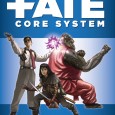Welcome back to Narrative Control, season 3. This season we’re taking calls from listeners and offering up what advice we can about their gaming conundrums. This week we talked to Jamil Walker about presenting non-violent opposition for his PCs. This really touched on a cornerstone of our GMing styles. It’s a good 40 minutes. Have a listen!
Hosts: Sean Nittner, Eric Fattig, and Lenny Balsera
Guest Caller: Jamil Walker
Length: 42.16
Show Notes
[00:26] Introduction to the show. Jamil Walker from http://www.meetup.com/Indie-Gamers-Network/ comes on to talk about non-violent opposition.
[01:08] Explicit warning on!
[01:26] Discussion about GMing styles. How does a player self-identify what kind of GM they are looking for?
[02:59] Diversity in the hobby making the term role-playing game and elusive term.
[05:55] Cons using symbols to designate content of games (legend). Big Bad Con will start using something like this. http://www.bigbadcon.com/
[08:18] Welcome Jamil Walker to the show. Playing Apocalypse world and trying to fight the knee jerk reaction of going straight to violence.
[09:43] Constant violence stalls character development long term.
[10:28] Apocalypse World tools for creating interwoven threats: Fronts!
[11:55] We start the cult discussion.
[12:15] Violence does work as an impetus to action. A threat you can’t ignore.
[13:24] Branching out to find other threats they have to respond to.
[14:00] Cult example, everyone leaving the hold to enter the wasting desert.
[14:42] What do the player characters care about?
[15:09] Real life example: Being blackmailed for breaking company policy, stakes are losing your job.
[16:01] Back to the cult. Threatening to change your home. Arguing with your boon companions…risking becoming a pariah in your own community.
[17:28] Trap with Apocalypse World: The setting depicts people focused only on survival but he process of play proves that image wrong.
[18:11] Start with questions. Find out where the dependencies are and work with those.
[20:04] Connect problems to scarcity – deny things. Have an NPC say “no”.
[22:28] Stop thinking about people in terms of their fantastic characteristics, and think of how people say no to you.
[24:04] Superman’s real Kryptonite – People being afraid of him.
[25:18] Push the denial strongly. Let the players initiate the violence.
[26:37] You can get a lot of mileage out of the repercussions of violence.
[27:35] Make NPCs as fickle as needed to present opposition.
[28:04] Give the players things. Allow them to win. Give them something they care about.
[29:09] Enforcement of denial. How’s it work? Jamil’s notes.
[30:52] Slow your roll there… use the details of the setting.
[33:44] Someone lied. Lies start a chain of consequences.
[35:16] It’s okay for the players to feel on top of the world. It makes defeat that mush more brutal.
[37:00] Letting the players win. Legitimate victories chip away at the problem of “only caring about being alive”.
[37:55] Get excited about their victories and defeats. Put your own emotions on the table.
[41:18] With that knowledge… you should run a game at Big Bad Con.
[41:37] Want to be on the show? Emails us narrativecontrol@gmail.com
Jamil’s notes from the show:
The trap of violence is that it demands action
Threaten What The Value
• Their peace
• Their resources
• Their loyalty
• Their homes
• They’re resources
Give them stuff. Love it to death. Then break your own heart
To “Push There”
Threaten something they have (object/relationship/group/resource)
• Someone wants to destroy it (to rebuilt, to consume, to make example of)
• Someone wants to change it (to serve a new purpose, to signify something malevolent)
• Someone wants it for themselves
• The thing they have disagrees with them
• The thing they have wants something harmful
And threaten via:
• Greater numbers (violent or non-violent)
• Denial of resources (shelter, supplies, protection)
• A tempting offer (away from the thing being threatened)
• A direct threat or warning
Someone can’t (or won’t) give them _______ because:
• someone else says they can’t
• they don’t think you deserve it
• they don’t want to do _____ anymore
• they don’t have it anymore (taken, spoiled, burned up, ran out)
• they don’t want what your offering in exchange (anymore)
• their supplier died/moved/cut them off.
The converstation continues…Here

